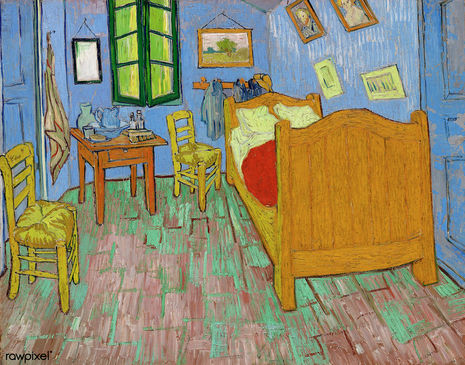A room of one’s own
“Our room is the only place where we are in charge” writes Sophie Holloway

The bunting in my room waltzes from wall to wall. It reminds me of gin-soaked summer evenings and the cool caress of a river breeze. But to others, perhaps it stirs memories of children’s parties. Perhaps it reminds people of the savagery of musical chairs, mountainous plates of scotch-eggs and grapes and Adopt-a-Goat-from-Kenya gifts. Or maybe it evokes a circus scene, maybe clownish faces spring to mind when people walk into my room, maybe they hear the sad clapping of a seal or feel the terrors of a tightrope. Or perhaps, they just feel nothing.
Even if I was the only person to ever set foot in my room, I would be very unhappy in a minimalist setting. I would be very unhappy if I had to give up my book display, my Michael Hutchence poster, my tennis racket and quilt. Their absence would feel very present. I would be feverishly trying to restore the completeness of my room.
But as I said, I would not be doing this for anyone else but myself. Of course, a room does have to perform at times. When you invite people in, you can’t help but take the credit (or brunt) for the creation that is your room. However, I think it is safe to say the majority of us style our rooms in a way that pleases us most, not others.
“As soon as we cross the threshold...it is up to us to express everything that our rooms do so easily and so forgivingly, to find a means of crystallising our core identities.”
But why is this? Why do we need to see ourselves reflected back at us? Is decorating one’s room a narcissistic indulgence? Or is this too cynical? Perhaps when we rest the books on their backs, string up the Michael Hutchence poster at a jagged angle, stand the racket on its head and roll up the quilt, we are just trying to settle? Perhaps we are just driven by a very primal need for belonging?
Our room is the only place where we are in charge. These idiosyncratic kingdoms are entirely at our command. We wear the crown and grace the throne (...that is the fire-resistant armchair from Ikea). Our rooms anchor us not to Surrey, or Hull, or the Republic of Congo, but to life on earth. Each 4 by 6 or 10 by 12 metre patch of carpet or wood or marble is universally unique to every one of us.
And not all rooms have dimensions and walls. For some, it is just a sheet of cardboard beneath a porch or a blanket beneath a bridge. Or perhaps, even less than this, a photo or a necklace. An object can harbour all sorts of feelings and memories, offering a port for reflection and re-engagement with the world.
In Maslow’s hierarchy of needs, self-actualisation is at the very top. It is our ‘last’ need, but it is perhaps what we crave the most of all. When we step out of our room, self-expression doesn’t come to a grinding halt. In fact, it becomes the squeakiest wheel, which we are forever oiling with such things as friendship, ambition and creativity.
Our desire to find people who give us that visceral buzz is reflected in the garland of bunting. The way it rises and falls, its shadows and colours, all of this is something we choose and fine-tune, perhaps subliminally, until we finally feel rooted in our decision.
Rooted – the key word. Similarly, it is in success that we feel a close interaction with our surroundings. We pursue it to exercise our identities and leave our mark, just as our decision to abandon Michael Hutchence at a drunken angle is a small and humble attempt to reflect a quirk, a spark of individuality.
Outside of our rooms, we are all vulnerable. As soon as we cross the threshold, be it carpet to wood or wood to carpet, it is up to us to express everything that our rooms do so easily and so forgivingly, to find a means of crystallising our core identities. This is an intimidating prospect. Suddenly, the stage is everyone’s and the quieter ones will fall as mice among geese.
Perhaps relationships with others could be enhanced were we to deepen our appreciation of their relationship with the world. Next time a friend shares a piece of music with you or invites you into their room, listen and see, don’t just hear and look. Maybe that way we will all achieve a greater sense of belonging in the chaotic rootlessness that is life.
 News / Clare Hall spent over £500k opposing busway 24 December 2025
News / Clare Hall spent over £500k opposing busway 24 December 2025 News / Caius mourns its tree-mendous loss23 December 2025
News / Caius mourns its tree-mendous loss23 December 2025 Comment / The ‘class’ of Cambridge24 December 2025
Comment / The ‘class’ of Cambridge24 December 2025 Comment / Yes, I’m brown – but I have more important things to say22 December 2025
Comment / Yes, I’m brown – but I have more important things to say22 December 2025 Interviews / Politics, your own way: Tilly Middlehurst on speaking out21 December 2025
Interviews / Politics, your own way: Tilly Middlehurst on speaking out21 December 2025










